人教版-高中英语必修3重点词汇、短语、句型、语法全汇总
人教版高中英语必修三知识详解
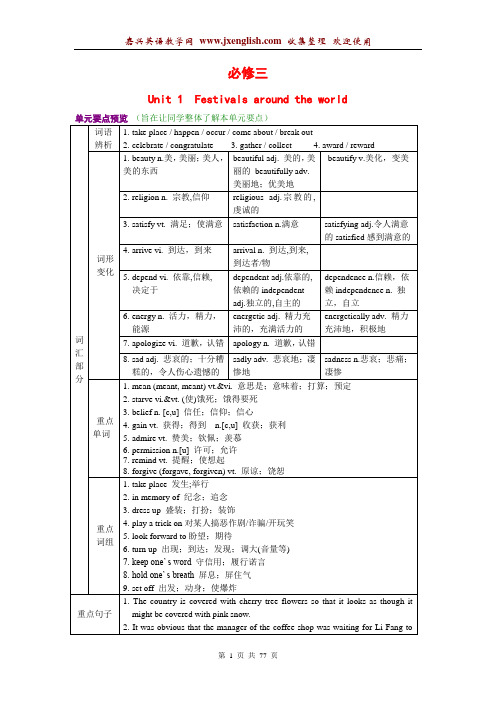
必修三Unit 1 Festivals around the world语言要点(模块)Ⅰ.词语辨析(旨在提供完形填空所需材料)Ⅱ.词性变化(旨在提供语法填空所需材料)Ⅲ.重点词汇(旨在提供词汇综合运用所需材料)1. mean (meant, meant) vt.&vi. 意思是;意味着;打算;预定[典例]1). The sign means that the road is blocked. 这个标志表示此路不通。
2). What do you mean to do with it? 你打算把它怎样处理?3). I mean you to work as our spokesman. 我想请你当我们的代言人。
[重点用法](sth.) mean doing sth. 意味着… (sb) mean to do sth. 打算做…had meant to do sth. 本来打算做某事be meant for 打算作……用;打算给…(sth.) be meant to do sth. 被预定/指定/认为做某事What do/did you mean by...? ―你……是什么意思?‖[练习] 按要求填空或翻译。
1). Can you tell me what this sentence______ (mean)?2). Your friendship ______ (mean) a great deal ______ (介词) me.3). In some parts of London, missing a bus means ______ (wait) for another hour.4). What did he mean ______ (介词) saying that remark?5). I ______ ______ ______ ______(本来打算来)yesterday, but I had an unexpected visitor.6). 这些房间是打算用作少年活动中心的。
新教材人教版高中英语选择性必修第三册Unit1 Art 单词短语句型语法等提炼汇总
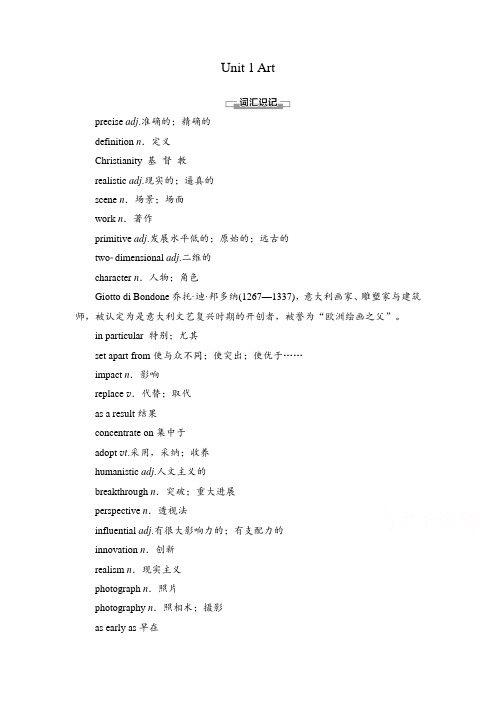
Unit 1 Artprecise adj.准确的;精确的definition n.定义Christianity 基督教realistic adj.现实的;逼真的scene n.场景;场面work n.著作primitive adj.发展水平低的;原始的;远古的twodimensional adj.二维的character n.人物;角色Giotto di Bondone乔托·迪·邦多纳(1267—1337),意大利画家、雕塑家与建筑师,被认定为是意大利文艺复兴时期的开创者,被誉为“欧洲绘画之父”。
in particular 特别;尤其set apart from使与众不同;使突出;使优于……impact n.影响replace v.代替;取代as a result结果concentrate on集中于adopt v t.采用,采纳;收养humanistic adj.人文主义的breakthrough n.突破;重大进展perspective n.透视法influential adj.有很大影响力的;有支配力的innovation n.创新realism n.现实主义photograph n.照片photography n.照相术;摄影as early as早在height n.高;高度reputation n.名誉;名声shadow n.影;阴影emphasis n.重点shift v t.转移;挪动noble n.贵族成员;出身高贵的人purchase v t.购买;采购accurate adj.精确的;准确的historical adj.历史的mythology n.神话;虚幻的想法client n.委托人;当事人;客户no longer不再preserve v.保存;保留emerge v i.&v t.出现;浮现;暴露convey v t.表达;传递;传送subjective adj.主观的detailed adj.详细的;详尽的focus on注意;集中于;聚焦于black-and-white photograph 黑白照片seek v.寻找;寻求outer adj.外边的;外围的subsequent adj.随后的;后来的;之后的analyse v.分析exist v.存在Cubism n.立体主义quality n.质量;品质1.real adj. 真实的;实际存在的;非凭空想象的;真的→reality n. 事实→realist n. 现实主义画家(或作家等);现实主义者→realism n.逼真;现实主义;务实作风→realistic adj. 现实的;逼真的2.human n.人→humanity n.人性;人道;(统称)人类→humanistic adj.人文主义的3.influence n.影响v.影响→influential adj.有很大影响力的;有支配力的4.emerge v i.&v t.出现;浮现;暴露→emergence n.出现;兴起5.sculpt v. 雕刻;雕塑;使具有某种形状→sculptor n. 雕刻家;雕塑家→sculpture n. 雕像;雕刻品;雕刻术rank n.(尤指较高的)地位;级别;军衔;行列v. 把……分等级;排列;使排成行①She was not used to mixing with people of high social rank. 级别②He was soon promoted to the rank of captain. 军衔③The tasks have been ranked in order of difficulty. 分等级④The report ranks the UK 20th out of 22 advanced nations. 排列Words and Phrases1[教材原句P2]In particular,his paintings are set apart from other paintings by their realistic human faces and deep emotional impact.尤其是他的绘画作品,更是以其逼真的人物面貌和深刻的情感冲击而从其他绘画作品中脱颖而出。
2019-2020学年高中英语人教版必修三全本知识点总结

2019-2020学年高中英语人教版必修三Unit 1III. Language points:1. mean1) mean+ to do打算,意欲2) mean+ n/ pron/that从句---意思3)mean+ v-ing意味meaning (n) 意思meaningful (a) 有意义的2. celebrate (v) celebration (n) 庆祝活动hold a celebration/ celebrations3. take place 不用于被动语态take sb’s place/ take the place of sb= replace sbtake place 指经过安排的事情happen 偶然发生,碰巧发生break out 灾难、疾病、战争等突然爆发4. would+ v 过去常常…5. starve starve for 急需starve to death 饿死6. Some festivals are held to honour the dead, or satisfy the ancestors, who could return either to help or todo harm.1) v 尊敬,给以荣誉2) in honor of 为了纪念A festival is set to honor/ in honor of the hero.Do harm to sb= harm sbDo more harm than good7. in memory of 纪念,悼念…8. arrive (v) arrival (n)The arrival of the plane has been delayed.____ my arrival at school, Mr Li was there.9. gain (n/ v)I gained a lot from my teacher. No pains, no gains.10. gather聚集,集合(vi) 收集(vt)1) A lot of people gathered to see what had happened.2) The student gathered a lot of information about the hero.11. award 奖励reward 回报,报酬He received an award of 1,000 dollars.He was awarded a medal for his excellent work.12. admire admire sb for sthThey admired our garden.I admired him for his success in business.13. look forward to(介词) + n/ v-ingI’m looking forward to his coming.--ward 向着…方向backward 向后forward 向前14. As though/ if 好象15. have fun with sb1. parking lot2. turn up3. keep one’s words4. hold one’s breath5. obvious—it was obvious that…6. set off7. remind ofUnit 2 Healthy eatingIII. 单元知识点(1):1.Wang Peng sat in his empty restaurant feeling very frustrated.feeling very frustrated现在分词在句中作伴随状语eg.She sat on the chair reading a newspaper.(表伴随)Walking in the street, she met her old friend.(表时间)Seeing no body at home , she decided to eat outside.(表原因)The child fell, striking his head against the ground.(表结果)2. His restaurant ought to be full of people.Ought to 1) to show a moral duty 表示一种道义上的责任,应该Eg.She ought to look after her child better.You ought to study hard to get a high mark.2)ought to have done 表示本应该…,而却没有…Eg.You ought to have come yesterday.3.He thought of his mutton kebabs, fatty pork cooked in the hottest, finest oil. 过去分词短语作后置定语,表被动。
新教材 人教版高中英语必修第三册全册各单元重点语法汇总
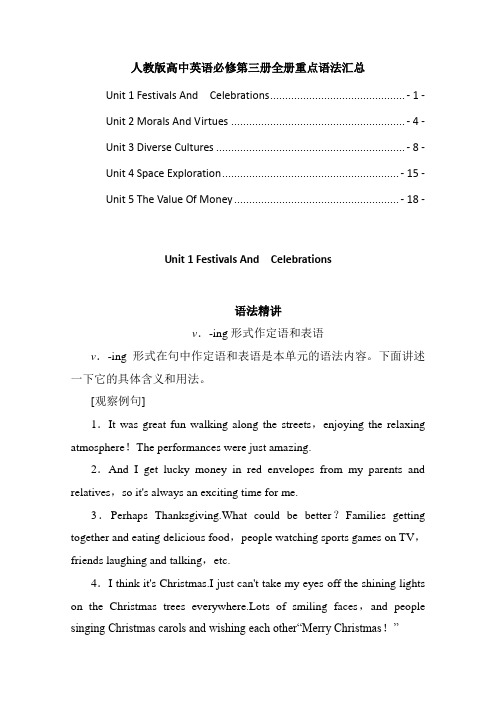
人教版高中英语必修第三册全册重点语法汇总Unit 1 Festivals And Celebrations ............................................. - 1 - Unit 2 Morals And Virtues .......................................................... - 4 - Unit 3 Diverse Cultures ............................................................... - 8 - Unit 4 Space Exploration ........................................................... - 15 - Unit 5 The Value Of Money ....................................................... - 18 -Unit 1 Festivals And Celebrations语法精讲v.-ing形式作定语和表语v.-ing形式在句中作定语和表语是本单元的语法内容。
下面讲述一下它的具体含义和用法。
[观察例句]1.It was great fun walking along the streets,enjoying the relaxing atmosphere!The performances were just amazing.2.And I get lucky money in red envelopes from my parents and relatives,so it's always an exciting time for me.3.Perhaps Thanksgiving.What could be better?Families getting together and eating delicious food,people watching sports games on TV,friends laughing and talking,etc.4.I think it's Christmas.I just can't take my eyes off the shining lights on the Christmas trees everywhere.Lots of smiling faces,and people singing Christmas carols and wishing each other“Merry Christmas!”[归纳用法]一、v.-ing形式作定语1.单个动词的-ing形式作定语位于被修饰名词的前面,既可以表示被修饰者的作用或功能,也可以表示被修饰者的动作或状态。
高中英语人教版必修三第三单元核心词汇和短语
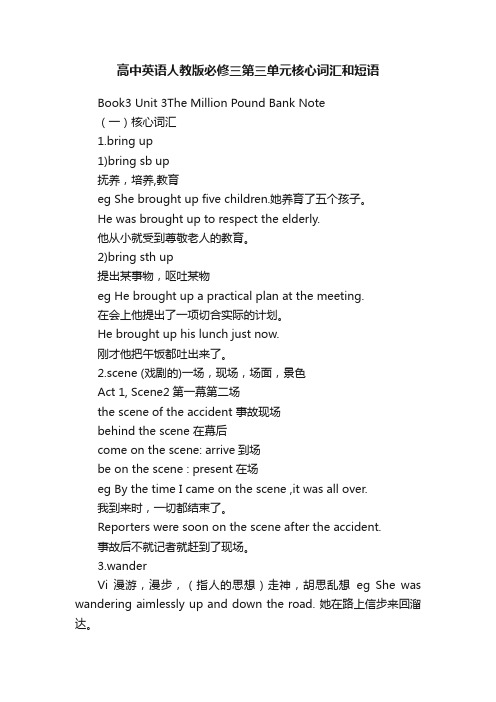
高中英语人教版必修三第三单元核心词汇和短语Book3 Unit 3The Million Pound Bank Note(一)核心词汇1.bring up1)bring sb up抚养,培养,教育eg She brought up five children.她养育了五个孩子。
He was brought up to respect the elderly.他从小就受到尊敬老人的教育。
2)bring sth up提出某事物,呕吐某物eg He brought up a practical plan at the meeting.在会上他提出了一项切合实际的计划。
He brought up his lunch just now.刚才他把午饭都吐出来了。
2.scene (戏剧的)一场,现场,场面,景色Act 1, Scene2第一幕第二场the scene of the accident 事故现场behind the scene 在幕后come on the scene: arrive到场be on the scene : present在场eg By the time I came on the scene ,it was all over.我到来时,一切都结束了。
Reporters were soon on the scene after the accident.事故后不就记者就赶到了现场。
3.wanderVi 漫游,漫步,(指人的思想)走神,胡思乱想eg She was wandering aimlessly up and down the road. 她在路上信步来回溜达。
Don’t let your mind wander.不要思想开小差。
4.permitn 许可证,通行证a driving permit 驾驶执照照vt & vi(permitted ,permitted) 许可,允许permit sb to do sth 允许某人做某事permit doing sth 允许做某事eg Visitors are not permitted to take photos.参观者请勿拍照片。
人教版高中英语必修三词汇表(1-5单元)(含教材例句及词汇用法讲解)

人教版高中英语必修三词汇表(1-5单元)(含教材例句及词汇用法讲解)本词汇表主要特色:1.呈现教材原文例句,重视词汇在语境中的运用。
2.词汇用法讲解紧扣新课标和新考纲,深度和广度适中,条理清晰,系统完整。
3.精选高考真题例句、词典例句和时文例句,例句具有典型性和示范性。
4.展示高考真题,揭示高考命题角度和思路。
5.适合高一学生同步使用以及高三学生总复习使用。
Book3 Unit 11. take place 发生;举行(不用被动语态)Discuss when they take place, what they celebrate and what people do at that time.讨论一下这些节日什么时候发生,庆祝什么,人们在那时会做些什么。
(p1)In the past ten years, great changes have taken place in my hometown.在过去的十年里,我的家乡发生了巨大变化。
The film festival takes place in October. 电影节将于十月举行。
My brother’s wedding will take place on May1st. 我哥哥的婚礼将于5月1日举行。
【拓展】take sb's/sth's place = take the place of sb/sth 代替;替换She couldn't attend the meeting so her assistant took her place.她不能参加会议,所以她的助手代她出席。
Computers have taken the place of typewriters in most offices.在大多数办公室,电脑已经取代了打字机。
Mulan took her father’s place to fight in the army.= Mulan took the place of her father to fight in the army.她替父从军打仗。
(完整版)人教版高中英语必修三重点词组归纳

人教版高中英语必修三要点词组概括Unit11)mean doing sth. 意味着 ;2)mean to do sth. 打算或企做某事 ;3)mean sb. to do sth.打算某人做某事4)be meant for 打算作⋯⋯用 ;5)take place 生;行6) of all kinds各样各的7)starve to death 死8)be starved of 缺少 ,9)starve for sth / starve to do,期望10)plenty of 大批 ; 充分11)be satisfied with 感觉意12)to one ’ s satisfaction感觉意是13)7do harm to sb.=do sb. harm 害某人14)in the shape of 呈⋯的形状,以⋯形式15)in memory of/ to the memory of sb 念某人16)dress up 穿衣服 ;妆扮 ,化妆17)award sth.(to sb.)予、18)award sb.sth.(for sth.) 予、19)reward sb. for sth. 因⋯某人;20)reward sb. with sth. 用某物酬某人21)admire sb. for sth 在某方面佩某人22)look forward to 希望,期望,期望23)turn up.来;出 ;把 (收音机等 )音量开大些24)turn down 拒 ;25) turn off关掉;26)turn on 翻开 ;27)turn out 果是 ......28) turn to sb. for help向某人求援29)keep one ’ s word守信誉;30)break one ’ s word,失期31)It be obvious that-clause 而易32)set off 身 , 出 ;33)set in 开始 ;34) set up 成立,立;35)set out to do = set about doing sth.着手做某事36)set down 写下,下37)remind sb. of sth. 提示,使想起Unit 21) a healthy diet 健康食 ;2) a balanced diet 均衡的食3)in different way 用此外方式4)most often 最常5)feel frustrated 感觉沮6)by lunchtime 到午饭7)must have happened必定生8)at the end of the street 在街道的尽9)be tired of 倦10)be amazed at sth. ...感觉诧异11)throw away 抛弃12)get away with 逃走13)tell lies14)energy-giving food 供给量的食品15)body-building foods 供给养的食品16)feel fit 保持精力旺盛17)do some research into做一些 ...方面的研究18)the weakness of the diet食的短处19)the strength of the diet 食的点20)earn one ’ s living生21)be in debt22)glare at 怒23)move round24)spy on 在暗中察;打听25)upset sb.使 ......不安26)heavy food 不易消化的食品27)look ill 感觉不舒畅28)feel sick 感觉心29)chat(ting) about 聊起对于 ......30)serve with 用......配31)rather than 而不是32)cut down 减少33)before long 不久Unit 31)know about 认识对于⋯事2)make a bet 打3)win or lose the bet 在打中或4) have bad luck运气不好5)step inside 走里面6) lead the way路7)I wonder if 我想知道能否⋯8) go right ahead下去9)as a matter of fact 事上10)by accident 有时11)sail out of the bay 出海湾12)stare at 着13) towards nightfall到夜幕降14)carry ⋯ out to sea把⋯到了海洋15)give oneself up for lost 因迷路望16)work as an unpaid hand 免17)account for 致18)to be honest 坦率地19)be on my way上路20)show sb. out把某人出去21)be confident about ⋯ 自信22)the cost of a journey 旅游用23)give sb. a ride 某人搭24)lose one ’ s patience失掉耐心25)fall over 跌到26)show a willingness to do sth.表示意做某事27)be reserved 被定了28) take the gentleman’ s order那位士点菜29)take a chance 碰试运气30)the look on the w aiter ’ s face服上的表情31)read the bill 看32)in a rude manner 用粗的方式33) for a while一会儿Unit 41)think of ⋯ as把⋯⋯看作是2) a cloud of energetic dust 拥有能量的埃3) combine into⋯合成⋯⋯4)move around the sun 太阳运5)become violent 得强烈6)the solid surface 固体表面7)explode loudly 剧烈爆炸8)in time 及,最9)produce the water vapor 生水蒸汽10)make the earth ’ s atmosphere组成了地球的大气层11)cool down 冷却12)on the surface 在表面13)be different from与⋯⋯不一样14)go round the sun 太阳运15)disappear from从⋯⋯⋯消逝16)stay on ⋯存留在⋯⋯17)show one ’ s quality某人的特征18) dissolve harmful gases 分解,溶解有害气体,19)become part of ⋯成⋯⋯的一部分20)develop life 展生命 ,21)grow in the water 在水里生22)encourage the development of 鼓舞⋯⋯的展 ,23)millions of years later 几万年此后24)live on land 在地上生活 ,25)live in the sea 在海里生计26)grow into forests 成丛林 ,27)produce young 生出幼仔28)lay eggs 下蛋 ,29)animals with hands and feet 着手脚的物30)spread all over the earth遍及全球 ,31)develop new methods 展了新的方法32)move around 迁移 ,33)go by 去,推移34)prevent ⋯ from ⋯防备⋯⋯做⋯⋯ ,35)escape from ⋯ into 从⋯⋯⋯逃离到⋯⋯36)depend on ⋯依.靠,依,取决与⋯⋯,37)solve a problem 解决38)be lucky enough 足好运 ,39)make a trip 去旅游40)visit the moon 参月球 ,41)in the spaceship 在太空船中42)explain to ⋯ that向⋯⋯解⋯⋯ ,43)on the journey 在旅途中44)be off 出发 ,45)rise into the air 升人太空46)feel the pull of the earth 感到地球的拉力 ,47)call ⋯ gravity称⋯⋯地球引力48)push⋯ into the seat把⋯⋯推向座位 ,49)say ⋯ to each other向相互⋯⋯50)fall back to 朝⋯⋯⋯落下去 ,51)fall from a tree 从上掉下来52)fall to the ground 朝地上落下去 ,53) get close to接⋯近⋯⋯54)cheer up 高起来 ,55)float weightlessly around 失重来去56)in the spaceship cabin 太空船 ,57)watch ⋯ do看着⋯⋯做58)move freely 自由的活 ,59)climb down the steps 从梯上爬下来60)step forward 向前步 ,61)fall over 跌倒62)need practice 需要63)get the hang of 掌⋯握了⋯⋯的64)enjoy oneself 感觉自如 ,65)leave the moon ’ s gravity脱月球引力66)come back to ⋯回到⋯⋯Unit 51)frost on the ground 地上覆盖了一薄霜2)around noon 正午分 ,3)leave for 离⋯开去⋯⋯4)go up the tower 登上塔5)look across the lake 俯瞰湖面6)flow into⋯人流⋯⋯7)flow over⋯流⋯⋯8)on one ’ s way to在⋯去⋯⋯的路上9) a covered stadium 加的运10)walk north 向北走11)move to ⋯移居到⋯⋯12)meet⋯ at ⋯在⋯⋯迎接⋯⋯13)come from South China 来自中国南方14)go as far as Ottawa去到至渥太15)ake too long 花的16)at dawn 拂晓17)at the train station 在火站18)have English words in small letters有小字体的英文注19)go downtown 到市里去20)be close to 接⋯,近⋯⋯21)spend the afternoon in the lovely shops整个下午在可的商铺22)visit ⋯ in 在⋯⋯⋯拜⋯⋯23)sit in a caf 坐在é咖啡24) look over⋯瞭望⋯⋯25)sit down with 和⋯⋯⋯坐在一同26)on a train trip across ⋯坐着火上横穿⋯⋯27)have a French culture 拥有法国文化28) speed along the river toward沿着河⋯流驶向⋯29)dream of ⋯梦想⋯⋯30)on a trip 在旅途中31)on the Atlantic coast 在大西洋海岸32)take the aeroplane乘机33)fly from ⋯ to 从⋯⋯⋯行到⋯⋯34) take the train from⋯乘to火⋯从⋯⋯ 到⋯⋯35)from west to east 从西到36)across Canada横穿加拿大37)cross the whole country 横整个国家38)at the airport 在机39)take ⋯ to ⋯把⋯⋯到⋯⋯40)catch the train 乘坐火41)on the way to 在⋯去⋯⋯的路上42)see great scenery看美壮的景43)on the trip 在旅途中44)go eastward 向东行驶45)pass cities 经过城市46)in less than five days 在不五天的时间里47)from coast to coast 从一个海岸到另一个海岸。
高中英语人教必修三unit3单词,短语,重点句型梳理
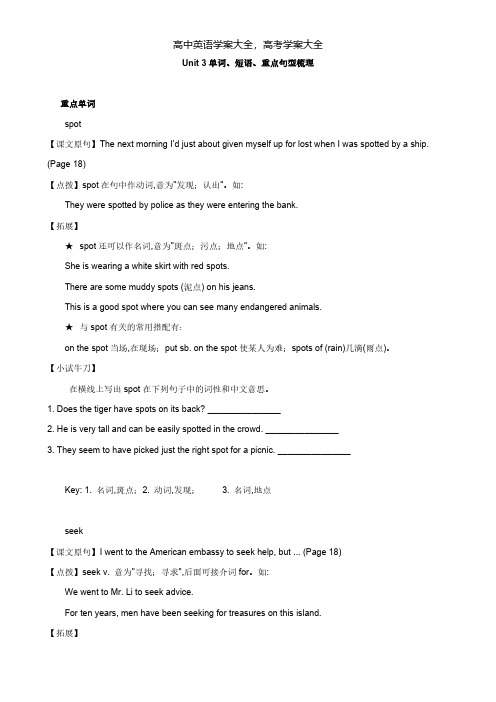
Unit 3单词、短语、重点句型梳理重点单词spot【课文原句】The next morning I’d just about given myself up for lost when I was spotted by a ship. (Page 18)【点拨】spot在句中作动词,意为"发现;认出"。
如:They were spotted by police as they were entering the bank.【拓展】★spot还可以作名词,意为"斑点;污点;地点"。
如:She is wearing a white skirt with red spots.There are some muddy spots (泥点) on his jeans.This is a good spot where you can see many endangered animals.★与spot有关的常用搭配有:on the spot当场,在现场;put sb. on the spot使某人为难;spots of (rain)几滴(雨点)。
【小试牛刀】在横线上写出spot在下列句子中的词性和中文意思。
1. Does the tiger have spots on its back? _______________2. He is very tall and can be easily spotted in the crowd. _______________3. They seem to have picked just the right spot for a picnic. _______________Key: 1. 名词,斑点;2. 动词,发现; 3. 名词,地点seek【课文原句】I went to the American embassy to seek help, but ... (Page 18)【点拨】seek v. 意为"寻找;寻求",后面可接介词for。
- 1、下载文档前请自行甄别文档内容的完整性,平台不提供额外的编辑、内容补充、找答案等附加服务。
- 2、"仅部分预览"的文档,不可在线预览部分如存在完整性等问题,可反馈申请退款(可完整预览的文档不适用该条件!)。
- 3、如文档侵犯您的权益,请联系客服反馈,我们会尽快为您处理(人工客服工作时间:9:00-18:30)。
人教版| 必修3重点词汇、短语、句型、语法全汇总Unit1 Festivals around the world【重点词汇、短语】1. take place 发生2. religious 宗教的3. in memory of 纪念4. belief 信任,信心,信仰5. dress up 盛装,打扮6. trick 诡计,窍门7. play a trick on 搞恶作剧,诈骗8. gain 获得9. gather 搜集,集合10. award 奖品,授予11. admire 赞美,钦佩12. look forward to 期望,盼望13. day and night 日夜14. as though 好像15. have fun with 玩的开心16. permission 许可,允许17. turn up 出现,到场18. keep one’s word 守信用19. hold one’s breath 屏息20. apologize道歉21. obvious 显然的22. set off 出发,动身,使爆炸【重点句型】1. Please make sure when and where the accident took place.请查清楚事故是何时何地发生的。
2. Some festival are held to honour the dead, or satisfy and please the ancestors, who could return either to help or to do harm.还有一些节日,是为了纪念死者、满足或取悦祖先,因为(祖先们)有可能回到世上帮助他们,也有可能带来危害。
3. In Japan the festival is called Obon,when people should go to clean the graves and light incense in memory of their ancestors.(非限制性定语从句)在日本,这个节叫孟兰盆节,在这个节日里,人们要上坟、扫墓、烧香,以缅怀祖先。
4. They dress up and try to frighten people.他们乔装打扮去吓唬别人。
5. If they are not given anything, the children might play a trick.如果你什么也不打发给孩子,他们可能会捉弄别人。
6. In India there is a national festival on October 2 to honour Mahatma Gandhi, the leader who helped gain India's independence from Britain. 在印度,10月2日是纪念马哈特马.甘地的全国性节日,他是帮助印度脱离英国而独立的领袖。
7. The most energetic and important festivals are the ones that look forward to the end of winter and to the coming of spring.最富生气而又最重要的节日,就是告别冬天、迎来春天的日子。
8. The country is covered with cherry tree flowers so that it looks as though it might be covered with pink snow.整个国度处处都是樱花盛开,看上去就像罩上了一层粉红色的雪。
【语法总结】情态动词定义:情态动词是一种本身有一定的词义、但要与动词原形及其被动语态一起使用,给谓语动词增添情态色彩,表示说话人对有关行为或事物的态度和看法,认为其可能、应该或必要等。
情态动词数量不多,主要有下列:can (could), may (might), must, need, ought to, dare (dared), shall (should), will (would),have (to) ,had better.一. can和could的用法1. 表示能力或客观可能性,还可以表示请求和允许。
注意:①could也可表示请求,语气委婉,主要用于疑问句,不可用于肯定句,答语应用can。
②can表示能力时,还可用be able to代替。
2. 表示惊异、怀疑、不相信的态度。
(主要用在否定句、疑问句或惊叹句中)3. “can(could) + have + 过去分词”的疑问或否定形式表示对过去发生的行为怀疑或不肯定。
4. 用在疑问句及否定句中,表示惊讶,不相信等。
5. cannot…too...表示“无论怎样……也不过分”二. may和might的用法1. 表示许可。
表示请求、允许时,might比may的语气更委婉一些,否定回答时(口语中常用) no , you can’t . or , yes, please 用mustn’t表示“不可以”、“禁止”、“阻止”之意(具有强烈禁止的意思)。
用May I…征询对方许可在文体上比较正式,在口气上比较客气。
在日常口语中,用Can I ... 征询对方意见在现代口语中更为常见。
2. 用于祈使句中表示祝愿。
3. 表示推测、可能(疑问句不能用于此意)。
4. “may(might) + have + 过去分词”表示对过去发生的行为的推测。
三. must和have to的用法1. 表示必须、必要。
(must表示主观多一些而have to则表示客观多一些)回答must引出的问句时,如果是否定的回答,不能用mustn’t,而要用needn’t或don’t have to。
2.“must be + 表语”的结构表示推测,它的否定或疑问式用can代替must。
3. “must + have + 过去分词”的结构常用在肯定句中,表示对过去发生的行为的推测。
它的否定或疑问式用can代替must。
4. have to的含义与must相似,两者往往可以互换使用,但have to有各种形式,随have的变化而定。
注意:have to也可拼做have got to。
四. dare和need的用法1. need表示“需要”,作情态动词时,仅用于否定句或疑问句中,在肯定句中一般用must, have to, ought to,或should代替。
注意:needn't + 不定式的完成式“表示本来不必做某事而实际上做了某事”2. dare作情态动词时,主要用于疑问句、否定句和条件状语从句中,一般不用在肯定句中。
3. dare和need常用作实义动词,有时态、人称和数的变化,所不同的是,作实义动词时,在肯定句中,dare后面通常接带to的不定式,在否定和疑问句中,dare后面可接带to或不带to的不定式。
五. shall和should的用法1. shall的用法:①shall用于第一人称,表示征求对方的意愿。
②shall用于第一、第三人称疑问句中,表示说话人征求对方的意见或向对方请示。
③shall用于第二、第三人称,表示说话人给对方命令、警告、允诺或威胁。
2. should的用法:①should表示劝告、建议、命令,其同义词是ought to;在疑问句中,通常用should代替ought to。
②Why(or How) + should结构表示说话人对某事不能理解,感到意外、惊异等意思。
意为“竟会”。
③“should + have + 过去分词”结构一般表示义务,表示应该做到而实际上没有做到,并包含一种埋怨、责备的口气。
六. will和would的用法1. 表示请求、建议等,would比will委婉客气。
2. 表示意志、愿望和决心。
3. 用“will be”和“will(would) + have + 过去分词”的结构表示推测,主要用于第二、三人称。
前者表示对目前情况的推测,后者表示对已经完成的动作或事态的推测。
4. would可表示过去反复发生的动作或某种倾向。
5. 表料想或猜想。
七. ought to的用法1. ought to表示应该。
2. 表示推测。
注意与must表示推测时的区别:He must be at home by now. (断定他已到家)He ought to be home by now. (不十分肯定)This is where the oil must be. (比较直率)This is where the oil ought to be. (比较含蓄)3. “ought to + have + 过去分词”表示过去应做某事而实际未做。
ought和should的区别:1.ought语气略强。
2.should较常用。
3.ought在美国英语中用的很少,而should却相当常用。
4.ought属正式用语。
八. used to,had better,would rather的用法1. used to表示过去的习惯动作或状态,现在已不存在,在间接引语中,其形式可不变。
如:He told us he used to play football when he was young.2. had better意为“最好”,后接不带to的不定式。
3. would rather意为“宁愿”,表选择,后接不带to的不定式。
Unit2 Healthy eating【重点词汇、短语】1. diet 日常饮食,节食2. balance 平衡,天平3. fry 油炸4. ought to 应该5. lose weigh 减肥6. raw 生的,未加工的7. get away with 被放过,(做坏事)不受惩罚8. tell a lie 说谎9. win…back 赢回10. strength强项,长处,力量11. consult 咨询,请教12. earn one’s living 谋生13. debt 债14. in debt 欠债15. limit 限制,界限16. benefit 利益17. combine 联合,结合18. cut down 削减,删节19. before long 不久以后20. put on weight 增加体重【重点句型】1. The food you eat helps you grow in different ways.你吃的食物能以不同的方式帮你成长。
2. Standing on top of the tall building, we could see the whole city. 站在高楼的顶部,我们能看到整个城市。
